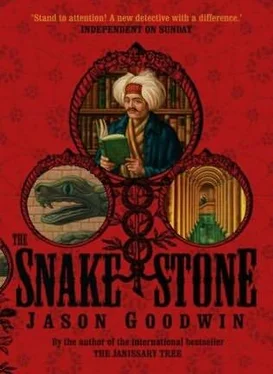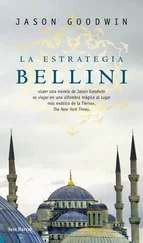Jason Goodwin - The snake stone
Здесь есть возможность читать онлайн «Jason Goodwin - The snake stone» весь текст электронной книги совершенно бесплатно (целиком полную версию без сокращений). В некоторых случаях можно слушать аудио, скачать через торрент в формате fb2 и присутствует краткое содержание. Жанр: Исторический детектив, на английском языке. Описание произведения, (предисловие) а так же отзывы посетителей доступны на портале библиотеки ЛибКат.
- Название:The snake stone
- Автор:
- Жанр:
- Год:неизвестен
- ISBN:нет данных
- Рейтинг книги:4 / 5. Голосов: 1
-
Избранное:Добавить в избранное
- Отзывы:
-
Ваша оценка:
- 80
- 1
- 2
- 3
- 4
- 5
The snake stone: краткое содержание, описание и аннотация
Предлагаем к чтению аннотацию, описание, краткое содержание или предисловие (зависит от того, что написал сам автор книги «The snake stone»). Если вы не нашли необходимую информацию о книге — напишите в комментариях, мы постараемся отыскать её.
The snake stone — читать онлайн бесплатно полную книгу (весь текст) целиком
Ниже представлен текст книги, разбитый по страницам. Система сохранения места последней прочитанной страницы, позволяет с удобством читать онлайн бесплатно книгу «The snake stone», без необходимости каждый раз заново искать на чём Вы остановились. Поставьте закладку, и сможете в любой момент перейти на страницу, на которой закончили чтение.
Интервал:
Закладка:
Jason Goodwin
The snake stone
1
The voice was low and rough and it came from behind as dusk fell.
“Hey, George.”
It was the hour of the evening prayer, when you could no longer distinguish between a black thread and a white one, in ordinary light. George pulled the paring knife from his belt and sliced it through the air as he turned. All over Istanbul, muezzins in their minarets threw back their heads and began to chant.
It was a good time to kick a man to death in the street.
The grainy ululations swept in sobbing waves across the Golden Horn, where the Greek oarsmen on the gliding caiques were lighting their lamps. The notes of prayer rolled over the European town at Pera, a few lights wavering against the black ridge of Pera Hill. They skimmed the Bosphorus to Uskudar, a smudge of purple fading back into the blackness of the mountains; and from there, on the Asian side, the mosques on the waterline echoed them back.
A foot caught George in the small of his back. George’s arms went wide and he stumbled toward a man who had a long face as if he were sorrowing for something.
The sound swelled as muezzin after muezzin picked up the cry, weaving between the city’s minarets the shimmer of a chant that expressed in a thousand ways the infirmity of man and the oneness of God.
After that the knife wasn’t any good.
The call to prayer lasts about two and a half minutes, but for George it stopped sooner. The sad-faced man stooped and picked up the knife. It was very sharp, but its end was broken. It wasn’t a knife for a fight. He threw it into the shadows.
When the men had gone, a yellow dog came cautiously out of a nearby doorway. A second dog slunk forward on its belly and crouched close by, whining hopefully. Its tail thumped the ground. The first dog gave a low growl and showed its teeth.
2
Maximilien Lefevre leaned over the rail and plugged his cheroot into the surf which seethed from the ship’s hull. Seraglio Point was developing on the port bow, its trees still black and massy in the early light. As the ship rounded the point, revealing the Galata Tower on the heights of Pera, Lefevre pulled a handkerchief from his sleeve to wipe his hands; his skin was clammy from the salt air.
He looked up at the walls of the sultan’s palace, patting the back of his neck with the handkerchief. There was an ancient column in the Fourth Court of the seraglio, topped by a Corinthian capital, which was sometimes visible from the sea, between the trees. It was the lingering relic of an acropolis that had stood there many centuries ago, when Byzantium was nothing but a colony of the Greeks: before it became a second Rome, before it became the navel of the world. Most people didn’t know the column still existed; sometimes you saw it, sometimes not.
The ship heaved, and Lefevre gave a grunt of satisfaction.
Slowly the Stamboul shore of the Golden Horn came into view, a procession of domes and minarets that surged forward, one by one, and then modestly retired. Below the domes, cascading down to the busy waterfront, the roofs of Istanbul were glowing red and orange in the first sunlight. This was the panorama that visitors always admired: Constantinople, Istanbul, city of patriarchs and sultans, the busy kaleidoscope of the gorgeous East, the pride of fifteen centuries.
The disappointment came later.
Lefevre shrugged, lit another cheroot, and turned his attention to the deck. Four sailors in bare feet and dirty singlets were stooped by the anchor chain, awaiting their captain’s signal. Others were clawing up the sails overhead. The helmsman eased the ship to port, closing in on the shore and the countercurrent that would bring them to a stop. The captain raised his hand, the chain ran out with the sound of cannon fire, the anchor bit, and the ship heaved slowly back against the chain.
A boat was lowered, and Lefevre descended into it after his trunk.
At the Pera landing stage, a young Greek sailor jumped ashore with a stick to push back the crowd of touts. With his other hand he gestured for a tip.
Lefevre put a small coin into his hand and the young man spat.
“City moneys,” he said contemptuously. “City moneys very bad, Excellency.” He kept his hand out.
Lefevre winked. “Piastres de Malta,” he said quietly.
“Oho!” The Greek squinted at the coin and his face brightened. “Ve-ery good.” He redoubled his efforts with the touts. “These is robbers. You wants I finds you porter? Hotel? Very clean, Excellency.”
“No, thank you.”
“Bad mans here. You is first times in the city, Excellency?”
“No.” Lefevre shook his head.
The men on the landing stage fell silent. Some of them began to turn away. A man was approaching across the planked walk in green slippers. He was of medium build, with a head of snowy white hair. His eyes were piercingly blue. He wore baggy blue trousers, an open shirt of faded red cotton.
“Doctor Lefevre? Follow me, please.” Over his shoulder he said: “Your trunk will be taken care of.”
Lefevre gave a shrug. “A la prochaine.”
“ Adio, m’sieur,” the Greek sailor replied slowly.
3
That same morning, in the Fener district of Istanbul, Yashim woke in a slab of warm spring sunshine and sat up, drowsily rubbing his hands through his curls. After a few moments he cast aside his Korassian blanket and slid from the divan, dropping his feet automatically into a pair of gray leather baluches. He dressed quickly and went downstairs, through the low Byzantine doorway of the widow’s house, and out into the alley. A few turns took him to his favorite cafe on the Kara Davut, where the man at the stove gave him a nod and put a small copper saucepan on the fire.
Yashim settled himself on the divan facing the street, beneath the projecting upper windows. He slipped his feet under his robe, and with that gesture he became, in a sense, invisible.
It was partly the way Yashim still dressed. It was several years since the sultan had begun to encourage his subjects to adopt Western dress; the results were mixed. Many men had swapped their turbans for the scarlet fez, and their loose robes for trousers and the stambouline, a curiously high-necked, swallow-tailed jacket, but few of them wore European lace-up boots. Some of Yashim’s neighbors on the divan resembled black beetles, in bare feet; all elbows and pointy knees. In a long cloak, somewhere between deep red and brown, and a saffron-colored robe, Yashim might have been a ruck in the carpet that covered the divan; only his turban was dazzlingly white.
But Yashim’s invisibility was also a quality in the man-if man was the proper word. There was a stillness about him: a steadiness in the gaze of his gray eyes, a soft fluidity to his movements, or an easiness of gesture that seemed to deflect attention rather than attract it. People saw him-but they did not quite notice him, either; and it was this absence of hard edges, this peculiar withdrawal of challenge or threat, that comprised his essential talent and made him, even in nineteenth-century Istanbul, unique.
Yashim did not challenge the men who met him; or the women. With his kind face, gray eyes, dark curls barely touched, at forty, by the passage of the years, Yashim was a listener; a quiet questioner; and not entirely a man. Yashim was a eunuch.
He took his coffee propped up on one elbow, and ate the corek, brushing the crumbs from his mustache.
Deciding against having a pipe with his coffee, he left a silver piastre on the tray and walked down the street toward the Grand Bazaar.
At the corner he turned and glanced back, just in time to see the cafe owner pick up the coin and bite it. Yashim sighed. Bad money was like poison in the bowels, an irritant that Istanbul could never rid itself of. He hefted his purse and heard the dry rustle of his fortune susurrate between his fingertips: this was one of those times when currency seemed to melt like sugar in the hand. But sugar was sweet. The sultan was dying, and there was bitterness in the air.
Читать дальшеИнтервал:
Закладка:
Похожие книги на «The snake stone»
Представляем Вашему вниманию похожие книги на «The snake stone» списком для выбора. Мы отобрали схожую по названию и смыслу литературу в надежде предоставить читателям больше вариантов отыскать новые, интересные, ещё непрочитанные произведения.
Обсуждение, отзывы о книге «The snake stone» и просто собственные мнения читателей. Оставьте ваши комментарии, напишите, что Вы думаете о произведении, его смысле или главных героях. Укажите что конкретно понравилось, а что нет, и почему Вы так считаете.












